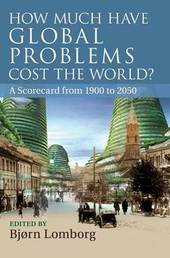
|
How Much Have Global Problems Cost the World?: A Scorecard from 1900 to 2050
Hardback
Main Details
| Title |
How Much Have Global Problems Cost the World?: A Scorecard from 1900 to 2050
|
| Authors and Contributors |
Edited by Bjorn Lomborg
|
| Physical Properties |
| Format:Hardback | | Pages:404 | | Dimensions(mm): Height 249,Width 173 |
|
| Category/Genre | Development economics |
|---|
| ISBN/Barcode |
9781107027336
|
| Classifications | Dewey:338.9 |
|---|
| Audience | | Professional & Vocational | |
|---|
| Illustrations |
118 Tables, black and white; 172 Line drawings, unspecified
|
|
Publishing Details |
| Publisher |
Cambridge University Press
|
| Imprint |
Cambridge University Press
|
| Publication Date |
10 October 2013 |
| Publication Country |
United Kingdom
|
Description
There are often blanket claims that the world is facing more problems than ever but there is a lack of empirical data to show where things have deteriorated or in fact improved. In this book, some of the world's leading economists discuss ten problems that have blighted human development, ranging from malnutrition, education, and climate change, to trade barriers and armed conflicts. Costs of the problems are quantified in percent of GDP, giving readers a unique opportunity to understand the development of each problem over the past century and the likely development into the middle of this century, and to compare the size of the challenges. For example: how bad was air pollution in 1900? How has it deteriorated and what about the future? Did climate change cost more than malnutrition in 2010? This pioneering initiative to provide answers to many of these questions will undoubtedly spark debate amongst a wide readership.
Author Biography
Bjorn Lomborg is Director of the Copenhagen Consensus Center and Adjunct Professor in the Department of Management, Politics and Philosophy at Copenhagen Business School. He is the author of the controversial bestseller, The Skeptical Environmentalist (Cambridge University Press, 2001) and was named one of the 'top 100 global thinkers' by Foreign Policy magazine in 2010, 2011 and 2012, one of the world's '100 most influential people' by Time and one of the '50 people who could save the planet' by The Guardian.
Reviews'For a volume covering such a large number of grim subjects, ranging from climate change and violent conflict to loss of bioversity and malnutrition, this is a surprisingly uplifting read. While mankind has succeeded in creating some depressingly disastrous social, natural and humanitarian disasters, we also have the power to alleviate and overcome these self-inflicted challenges. Bjorn Lomborg reminds us that for every part of mankind that can destroy, there is also one part that can create.' Tilman Bruck, Director, Stockholm International Peace Research Institute (SIPRI) 'This 150-year view of humanity's biggest challenges, measured in economic terms, gives unique data on the globe's important issues to students, teachers and the general public. Ultimately, it affords everyone the opportunity to answer with facts the questions of humanity's scorecard: are we doing better or worse? Overall, there is more good news than bad, but we could still do better.' Per Pinstrup-Andersen, H. E. Babcock Professor of Food, Nutrition and Public Policy and J. Thomas Clark Professor of Entrepreneurship, Cornell University 'This book is a bracing tonic. An excellent survey for students, teachers and the general public with a wealth of thought provoking material. If you want to know how the world is doing, and get hard, comparable numbers to back it up, this is where to go.' Alix Peterson Zwane, Executive Director, Evidence Action and the Deworm the World Initiative, and former Senior Program Officer, Bill and Melinda Gates Foundation
|